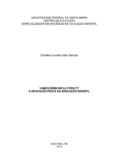| dc.contributor.advisor | Lorenzoni, Cândice Moura | |
| dc.creator | Santos, Camila Loureiro dos | |
| dc.date.accessioned | 2020-03-12T12:59:04Z | |
| dc.date.available | 2020-03-12T12:59:04Z | |
| dc.date.issued | 2016-09-23 | |
| dc.date.submitted | 2016 | |
| dc.identifier.uri | http://repositorio.ufsm.br/handle/1/19818 | |
| dc.description | Monografia (especialização) - Universidade Federal de Santa Maria, Centro de Educação, Curso de Especialização em Docência na Educação Infantil, RS, 2016. | por |
| dc.description.abstract | This paper presents a reflection and analysis on the role of Physical Education in kindergarten, seeking to understand the insertion of a physical education teacher in this context and possible interventions with children from 0 to 5 years. The research begins in the child's experiences of the author and the importance of these to her career choices. After this. proposes a number of restlessness about the physical education activities with children in early childhood education.In the data collection were performed records in videos and photographs of the activities with children, questionnaire with teachers of the institution and theoretical references relevant to the subject. In this context, it was noted that it is necessary to look for theoretical foundations in order to clarify the importance of physical education teacher to engage in a pedagogical purpose of this stage of education, considering that the experiences offered to children are not separated by disciplines and should prioritize the play and the movement. It was found that there are several bibliographies that address the issue of the movement in early childhood education, games, psicomotricity and motor development, but there is a shortage of materials that are able to understand the teaching practice in physical education classes to ensure the child's right to play and interact. The playing and the movement cannot be reduced as a pedagogical support for cognitive learning as literacy, or the development of skills that will be used in the future. After these reflections, it can be concluded that the pedagogical actions of a physical education teacher in early childhood education can contribute to the full development of the child, as she learns all the time, play all the time and moves all the time, but only if all this is allowed. | eng |
| dc.language | por | por |
| dc.publisher | Universidade Federal de Santa Maria | por |
| dc.rights | Acesso Aberto | por |
| dc.rights | Attribution-NonCommercial-NoDerivatives 4.0 International | * |
| dc.rights.uri | http://creativecommons.org/licenses/by-nc-nd/4.0/ | * |
| dc.subject | Educação infantil | por |
| dc.subject | Educação física | por |
| dc.subject | Brincar | por |
| dc.subject | Movimentar-se | por |
| dc.subject | Infância | por |
| dc.subject | Child education | eng |
| dc.subject | Physical education | eng |
| dc.subject | Play | eng |
| dc.subject | Movement | eng |
| dc.subject | Childhood | eng |
| dc.title | Vamos brincar lá fora?!? a educação física na educação infantil | por |
| dc.title.alternative | Lets play out there? the physical education in early childhood education | eng |
| dc.type | Trabalho de Conclusão de Curso de Especialização | por |
| dc.degree.local | Santa Maria, RS, Brasil | por |
| dc.degree.specialization | Docência na Educação Infantil | por |
| dc.description.resumo | Este trabalho apresenta uma reflexão e análise sobre o papel da Educação Física na Educação Infantil, buscando compreender a inserção do professor de Educação Física neste contexto e suas possíveis intervenções com crianças de 0 a 5 anos. A pesquisa parte das vivências da autora quando criança e a importância destas para suas escolhas profissionais. Logo após propõe uma série de inquietações acerca do trabalho de educação física realizado com crianças da educação infantil. Para a construção de dados foram realizados registros em vídeos e fotografias das atividades com crianças, questionário com professoras da instituição e referenciais teóricos pertinentes ao assunto. Neste contexto, percebeu-se que é necessário buscar fundamentações teóricas a fim de esclarecer a importância do professor de educação física se engajar na proposta pedagógica desta etapa da educação, considerando que as vivências oportunizadas às crianças não são separadas por disciplinas e devem priorizar o brincar e o movimentar-se. Constatou-se que existem diversas bibliografias da área que abordam a questão do movimento na educação infantil, jogos, psicomotricidade e desenvolvimento motor, porém existe uma carência de materiais que sejam capazes de compreender a prática pedagógica em aulas de educação física que garantam o direito da criança de brincar e interagir. O brincar e movimentar-se não pode ser reduzido como suporte pedagógico para as aprendizagens cognitivas como a alfabetização, ou para o desenvolvimento de habilidades que serão usadas futuramente. Após estas reflexões, chegou-se a conclusão de que as ações pedagógicas de um professor de educação física na educação infantil, podem sim contribuir para o desenvolvimento integral da criança, já que ela aprende o tempo todo, brinca o tempo todo e movimenta-se o tempo todo, mas somente se isto lhe for permitido. | por |
| dc.publisher.country | Brasil | por |
| dc.publisher.initials | UFSM | por |
| dc.subject.cnpq | CNPQ::CIENCIAS HUMANAS::EDUCACAO | por |
| dc.publisher.unidade | Centro de Educação | por |



